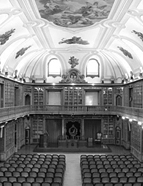

In view of the changes to the initial Institute of Historical Studies, research as far as students were concerned was well represented in the curriculum reform of 1957. Seminars were created to be integrated in the degree programme which were «mainly intended for the supervision of degree dissertations and the practical teaching of research methods». Its importance, in theory, may be noted in the legislator's caution, following similar guidelines to those of the 1930 reform, by establishing that «only by way of marked exception may first assistants be assigned the direction of seminars». They continued beyond 1974, within a different framework, fostering a breeding ground for the germination of generous vocations, many of them stimulated within the confines of the University Archive, where long, long before, A. de Vasconcelos, its director, had set the example.
It was in the Institute of Historical Studies, where Faculty knowledge initially appeared to fit, with the exception of Experimental Psychology, Geography and Phonetics, that the nascent historiography developed. The influence of its directors, a collective direction of the Faculty in its early years, imprinted a mark that remained for many decades to come.
The research and teaching of history obviously followed the prevailing cultural canons and guidelines, one of which recalled the results obtained in the natural sciences and their methods, which, as stated, were constantly and increasingly being applied «to the studies of the other specialties and particularly to the social sciences, history, philosophy and pedagogy» (decree of 24 December 1901, preamble, no. VII).
In this paradigm, history was a pure science, «une science comme la physique, ou comme la géologie», as stated by Fustel de Coulanges (1830-1889) at around 1875 (François Hartog, Le XIXe siècle, 1988, p. 358). The method of each subject, while safeguarding particularities, was characterised by the subordination to facts, as imposed by methodological monism. Even in Cultural History, and in the words of Joaquim de Carvalho in 1927, «without the patient and lucid hunt for facts, all constructions will be fragile and precarious», (Obra completa [Complete Works], I, 1978, p. 337). In 1930, the same teacher recalled that «the natural philosophy of the nineteenth century» was «the empire of objectivity and love of the fact, confident in a world, a cosmos in itself, that is, order, and in the eternity of some truths» (ibidem, p. 355).
